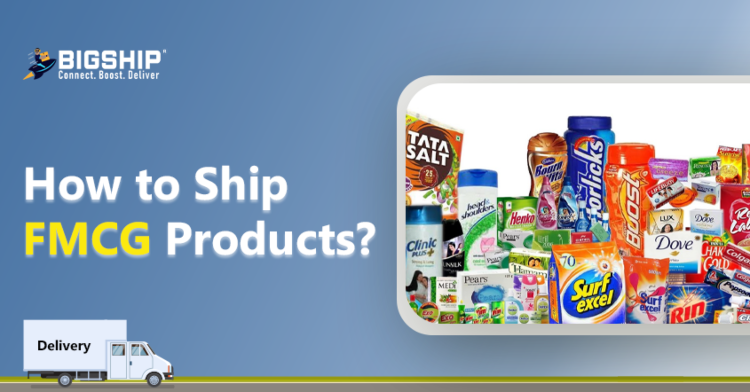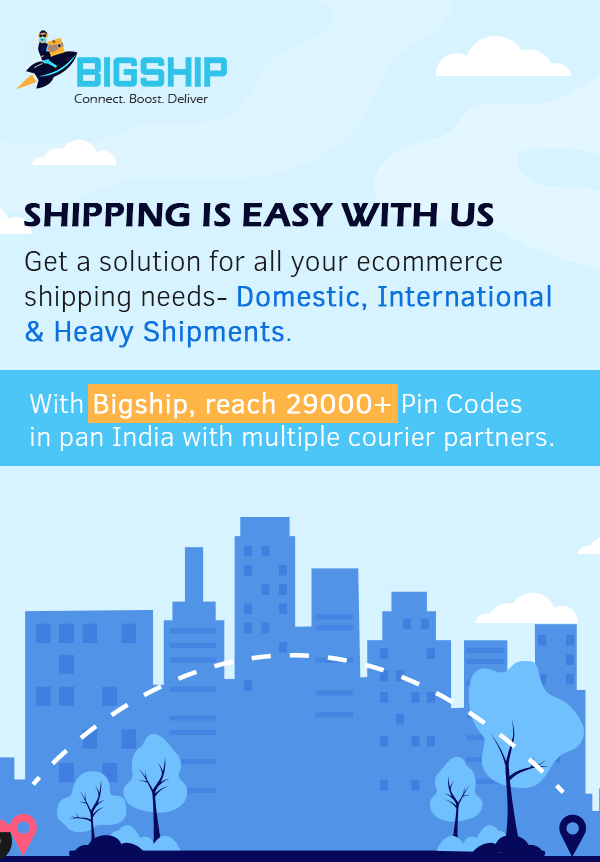How To Ship FMCG Efficiently: A Complete Guide

2. List of Fast Moving Consumer Goods
3. What are the Challenges in FMCG Logistics?
4. Steps to Streamlining FMCG Logistics
5. Scaling FMCG Businesses with Bigship’s Logistics Support
6. FAQs
The FMCG (Fast Moving Consumer Goods) industry is a rapidly growing sector, driven by rising consumer demand for everyday essentials like snacks, shampoos, and biscuits. With the global fast moving consumer goods market projected to reach USD 1400 billion by 2027, efficient logistics is critical for ensuring these products are available at the right time and place.

Today’s competitive market demands seamless delivery to maintain customer satisfaction and meet the short-self of goods. Well organized FMCG logistics plays a pivotal role in managing the transportation of these goods.
In this blog, we’ll explore how to ship fast moving consumer goods effectively, by ensuring timely delivery and business success.
What Does FMCG Items Mean?
Fast moving consumer goods (FMCG) are essential daily-use products that sell quickly and are typically low-cost. These include items such as packaged food, beverages, toiletries, cleaning products, and other household essentials that consumers use regularly and replace often.
A key characteristic of fast-moving products is their short shelf life. Many FMCG items, like dairy products or fresh food, are perishable and need to be sold quickly. These goods are commonly found in grocery stores, convenience shops, and hypermarkets. Due to their low profit margins, FMCG companies rely on high sales volumes and rapid inventory turnover to generate substantial revenue. This efficiency makes FMCG vital in meeting daily consumer needs.
List of Fast Moving Consumer Goods
FMCG covers a wide range of everyday items that are sold quickly and in high volumes. These items cater to various consumer needs available in grocery stores and supermarkets. Here’s a comprehensive list of fast-moving products:
Packaged Food: This category features processed and ready-to-eat food items like cheese, butter, pasta, cereals, cookies, and instant meals. These fast moving goods usually serve consumers looking for convenience and variety in their diets.
Beverages: FMCG includes a variety of packaged drinks such as bottled water, juices, energy drinks, aerated drinks, and ready-to-drink teas and coffees.
Cleaning and Laundry Products: Cleaning supplies like disinfectants, bleach, baking soda, laundry detergents, fabric softeners, utensil cleaners, and floor cleaning liquids are vital fast moving consumer goods used in daily household maintenance.
Personal Care and Cosmetics: Personal care products, including body wash, deodorants, skin creams, sunscreen, moisturizers, makeup products like concealers and foundations, are part of this category. These items address grooming and skincare needs.
Toiletries: Essential toiletries such as soaps, toothpaste, shampoo, conditioners, grooming products, and dental floss form a significant part of FMCG. These items are staples in every household and are replaced frequently.
Medicines: FMCG items also include non-prescription medications like aspirin, pain relievers, cough syrups, vitamins, and first-aid supplies such as band-aids and antiseptic creams.
Fresh Produce: Alongside packaged food, fruits, vegetables, dairy products, eggs, and meat products are considered in FMCG products.
Confectionary: Sweet treats such as candies, chewing gum, chocolates, nuts, toffees, and ice creams are also included under FMCG.
Pet Care Products: Items like pet food, grooming essentials, and cleaning supplies for pets are fast-moving goods often included in FMCG categories.
What are the Challenges in FMCG Logistics?
The logistics of FMCG items is complex due to the high inventory turnover rate, perishability, and demand for accuracy. Some of the common challenges encountered during the shipping of FMCG products are mentioned below.
Ensuring Timely Supply: Usually, manufacturers supply fast moving goods, but many are imported internationally. For instance, there’s a country X that imports a significant portion of its FMCG items, thus adding complexities of customs clearance and port delays.
Managing Inventory Effectively: The short shelf life of FMCG products makes inventory management challenging. Overstocking of items can lead to wastage, whereas, understocking risks losing market share to competitors. On the other hand, tracking multiple SKUs across warehouses, including e-commerce, requires accurate demand predictions.
Addressing Order Fulfilment Demands: The rise of e-commerce has increased consumer expectations for fast and flexible delivery options. From same-day delivery to click-and-collect services, order fulfillment for FMCG items has become a challenging task.
Steps to Streamlining FMCG Logistics
Managing the logistics of fast-moving consumer goods (FMCG) requires efficient planning to ensure quick and accurate deliveries. From inventory management to last-mile delivery, every step plays a critical role in creating a seamless experience for the customer. The key stages involved in FMCG logistics are given below.
Efficient Order Processing: The process begins with receiving and allocating the order to the appropriate inventory location. Then you must match orders with inventory to ensure stock availability, and route orders to the nearest fulfillment center for faster delivery. For click-and-collect options, assign orders to centers closest to the customer. Suppose offering same-day delivery, then partner with local couriers or a 3PL provider to ensure timely dispatch.
Smart Packaging Solutions: Once the order is assigned, the picking and packaging process begins. You can take advantage of technology like robotics and automation to speed up packing. Use sturdy packaging for long-haul deliveries, whereas, opt for lightweight courier satchels for local shipments.
Hassle-Free Shipping: After packaging, orders are dispatched according to your delivery strategy. If you have an in-house fleet, you can ship directly from your fulfillment centers to customers. Alternatively, partnering with local couriers for point-to-point deliveries is a viable option.
Real-Time Order Tracking: Customers highly value transparency, especially when it comes to fast-moving goods. Even with same-day or next-day delivery, providing tracking information helps build trust. Offering live updates on order status and sharing estimated delivery timelines keeps customers informed and reassured.
Seamless Delivery Experience: The final step in the process is delivering the order to the customer, and though it may be brief, it plays a crucial role in leaving a positive impression. Additionally, incorporating customer feedback surveys at this stage can further enhance satisfaction and help improve future service quality.
Scaling FMCG Businesses with Bigship’s Logistics Support
Growing an FMCG business requires efficient logistics to manage growing customer demands. Bigship offers comprehensive logistics solutions through its fast shipping service and robust courier network. With services like timely pickup & delivery, real-time tracking, and seamless last-mile solutions, Bigship helps businesses ensure customer satisfaction while managing costs.
By partnering with Bigship, FMCG businesses can streamline operations, meet tight delivery timelines, and focus on growth. Bigship ensures your logistics are ready to scale with your business.
Quickly sign up with Bigship to start sending your Fast Moving Consumer Goods anywhere in the country!
FAQs
Ques: How to ship FMCG products efficiently?
Ans: To ship FMCG efficiently, streamline your inventory management, use fulfillment centers near customers, adopt advanced tracking tools, and partner with reliable logistics partners like Bigship for timely delivery.
Ques: What is the best way to ship fast moving consumer goods?
Ans: The best way to ship fast moving consumer goods involves same-day or next-day shipping, proper & safe packaging for long distances.
Ques: How can FMCG logistics challenges be overcome?
Ans: FMCG logistics challenges can be tackled by ensuring proper inventory management, adopting automation for efficiency, and partnering with a trusted courier partner with a wide network.




